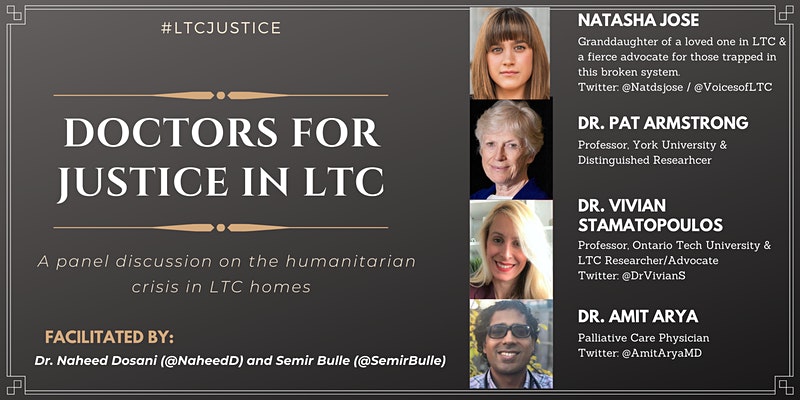Doctors for Justice in LTC rally together in online webinar to spread awareness of long-term care horrors

Doctors and care providers called the current long-term care home situation a “grave humanitarian crisis” in a panel discussion held Wednesday.
Doctors for Justice in LTC is a group of over 900 doctors, researchers and advocates who are calling on the Ontario government to end the violations occurring against long-term care residents.
Since the start of the COVID-19 pandemic, long-term care homes have been hit hard with mass transmission and lack of appropriate resources. Visits were banned and family members could no longer see their loved ones.
Natasha Jose, the granddaughter of a resident in a long-term care home, has been advocating for the rights of long-term care residents since last March.
“We were told by public health that their only mandate was to stop COVID transmission and that mental health was not their concern. This is the proverbial, ‘they can die, as long as it’s not COVID,’” she said. “That’s the message that we’re getting from public health, who are supposed to be watching over these residents.”
Without family visits and a lack of attention due to understaffing, the panellists said residents are greatly suffering with poor mental health. This is part of the reason why Vivian Stamatopoulos helped to co-found Doctors for Justice in LTC.
“For so many reasons, family is the crux that holds that system together. We’ve known for far too long that understaffing is a problem, well before the pandemic. So you’re shutting out these families who are filling crucial care gaps,” said Stamatopoulos. “You’re actually hurting these residents and (creating) trauma that is caused to these families.”
Mental health isn’t the only major issue in long-term care homes. Stamatopoulus said on top of everything else, there are critical problems permeating the for-profit long-term care industry.
“We’ve got a majority female, older, disabled population being cared for by a majority female racialized population,” she said. “There is a whole lot of sexism (in the industry) going on here and a whole lot of agism, racism and ableism.”
The for-profit long-term care industry is one that has been in need of reform for decades, said Dr. Amit Arya, another co-founder of Doctors for Justice in LTC. He said for-profit homes pay their staff less and are more likely to hire part-time casual staff.
“We know that for-profit long-term care homes have worse problems compared to the other homes,” said Arya. “At this point in the pandemic, agency staff who actually are not working in just one home but can be working in multiple homes are still being employed and used.”
Dr. Naheed Dosani said over 1,500 people died in long-term care homes — during the second wave of the pandemic alone.
“This rate is growing to the point where now one person per hour is dying from COVID-19 in a long term care facility in Ontario,” he said.
He said this number will only continue to grow until the government intervenes.
When asked what individuals outside of the health-care sector can do, Jose said that starting conversations with friends and family and becoming educated on the subject can make a difference. Following campaigns such as Doctors for LTC Justice and Voices of LTC can get people involved in the conversation.
“The big thing of this is, ignorance is bliss, so many people don’t understand what’s happening in long-term care homes,” said Jose. “That’s the only way there’s going to be any progress is having more voices and more people talking about this and being part of the conversation.”
The Doctors for LTC Justice team is committed to fighting for the families affected during this crisis, said Stamatopoulos.
“The evidence is unequivocal, and I will not back down on this and I will keep fighting. I promise you that.”
